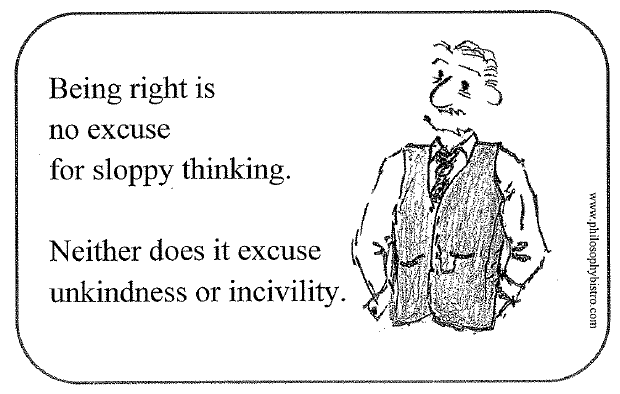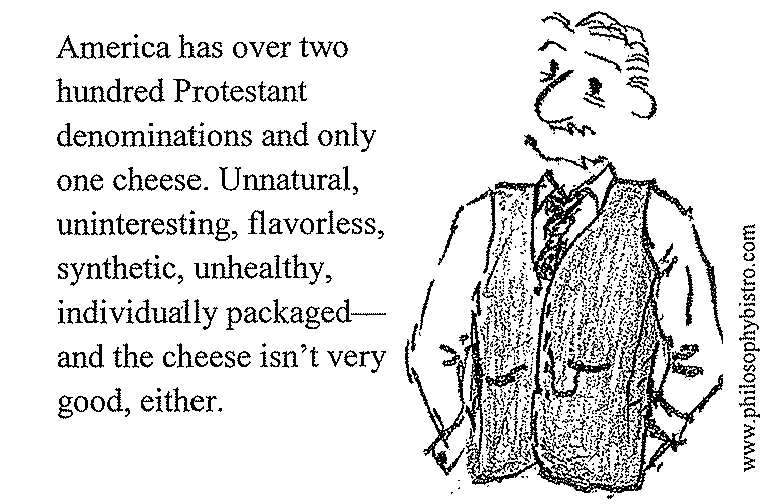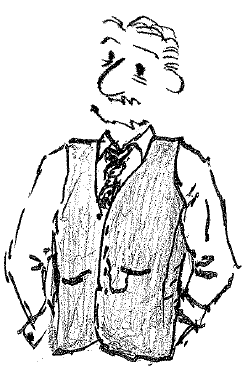My dear friends & gentle readers,
I have, unfortunately, had a cold this week, and, quite fortunately, a house guest, and am, as usual, running a little behind.
I thought this would be a good time to discuss my motto: “Being right is no excuse for sloppy thinking; neither does it excuse unkindness or incivility.”
Originally, it grew out of a bad habit of mine in philosophy. I have generally found that I am much clearer, and argue much more effectively, when I am discussing, explaining or defending philosophical standpoints that I do not share, or ideas which I disagree with. Sometimes, this led to misunderstandings of what my actual positions were. At one particular point in my career, I found myself in a nest of Fichteans—not unlike a wasp nest, except that wasps do perform some sort of useful function in nature. I felt, and still feel, that Fichte’s early 19th century quest for transcendental foundations was misguided, and, even though it purports to be a logical part of the Kantian project…
Yes, yes, Wode Toad, I know, but…
So, I found that it was difficult to argue against this position on how the mind shapes thought based in a very abstract German Idealism (the heirs of the German thinker Emmanuel Kant), and argue for a position on how the mind shapes thought based in observation of how humans actually function in human cultures and societies (the heirs of the German thinker Johann Gottfried Herder). The root of my problem was that it just seemed so obvious that the way to discuss thought was to actually pay attention to how human beings –in practice—think. Eventually, I asked myself “What would Herder do?” and left historical philosophy for social philosophy.
But, to begin a sentence with a conjunction, while I was still in the thick of this debate, and to remind myself that I still had to carefully argue for and defend the obvious, I put a sign up in my office that read:
“Being Right is No Excuse for Sloppy Thinking!”
A little later, I found myself as a Graduate Teaching Assistant for a wonderful Ethics professor, and was suddenly responsible for 124 students in a Professional Ethics class. The prof, a scrappy East Coast, Irish-American, ex-nun who also raised horses with her partner, was decidedly liberal—not radical, but liberal. One of the brighter students was a young Southern Baptist who had just returned from 2 years of missionary work, and he was, as you might expect, decidedly conservative.
At first, I found myself in the rather odd position of a referee. However, at some point early in the class, I was able to take him aside and sell him on the idea that if he was actually right, then he should be able to prove his ideas—or, at least, present and defend them in such a way as to meet her & philosophy’s standards. I shared my motto, telling him that “Being Right is No Excuse for Sloppy Thinking!” Because Baptists are, for the most part, good modernists and believe in absolute truth, and believe in the idea that truth is, at least in part, knowable and defendable, he accepted that position. As a result, he worked harder and— strangely enough—began to pay better attention to her actual positions, especially the ones he disagreed with. Neither of the two, of course, actually changed their opinions, but both of them started taking the other seriously.
However, there is more to life that rational argument. Many folks seem to believe that if they are right, that also gives them some sort of right and dominion to not care about the other human being them encounter during the average day. Our lives are filled with all sorts of interactions with our fellow human beings—some big and significant, others smaller and less so. Because we are human, we tend to pepper these interactions with kindness and cruelty, civility and rudeness, generosity and sullenness, hospitality and aloofness, patience and impatience, humor and ill-temper. For reasons I cannot explain, although I have given a great deal of thought to the matter, those who believe themselves in possession of some sort of absolute truth seem to be much less patient, and much more inclined to lash out at the rest of us. Once, during a communion meditation, I asked what it is about going to church on Sunday morning that makes Christians the most disagreeable customers to deal with on Sunday afternoon (something asked by almost all of my friends in retail or food).
I understand the temptation of being impatient with fools who do not understand what you understand or know what you know. Who hasn’t, at some point, wanted to, just yell:
You idiots! How can you not see the difference between Yams and Sweet Potatoes! They aren’t the same species; they aren’t even the same family or genus! They aren’t even from the same hemispheres! It’s not a subtle difference only clear to specialists like the designated hitter rules in the American and National Leagues, or the doctrinal differences between Catholicism, Orthodoxy, and the various Protestant denominations; this is a real, tangible difference! One is a monocot and the other is a dicot!
(Ok, maybe not that, but you get the idea. Insert your own personal hobby-horse, political view point or grammatical pet peeve here.)
The point is, each of us knows some things that other people do not know; each of us is right about something that somebody else is wrong about.
Wode Toad would like to point out that “impact” is not a verb, that you need to use your turn signal before you change lanes, that corporations  should have reasons for making major changes like removing furniture, that electronic readers and lime in beer are both despicable, don’t even get him started on the difference between a Caffè Macchiato and a Latte Macchiato, and that you should always use the Oxford comma and always write a letter back when you receive one!
should have reasons for making major changes like removing furniture, that electronic readers and lime in beer are both despicable, don’t even get him started on the difference between a Caffè Macchiato and a Latte Macchiato, and that you should always use the Oxford comma and always write a letter back when you receive one!
Wode Toad says: “thank you for listening.”
Being right about something doesn’t make us better; it gives us an obligation, a Noblesse Oblige, to help those who need that knowledge or to share it with those who would benefit by it. Being right does not excuse us from being kind or civil; it is precisely we who are right who should know better.
Perhaps there is a bit of an ironic tone to my motto, but I am confident in its truth, so confident that I do try to live by it. I am too old, and have spent way too much time among us mortals to have much confidence in our claims to be absolutely right. If it is possible to be completely right, it seems probable that clear, critical thinking, kindness and civility might bring us closer.
Regardless of being right, I am confident that clear thinking, kindness and civility bring us closer to being good, and that just might be all right for now.








